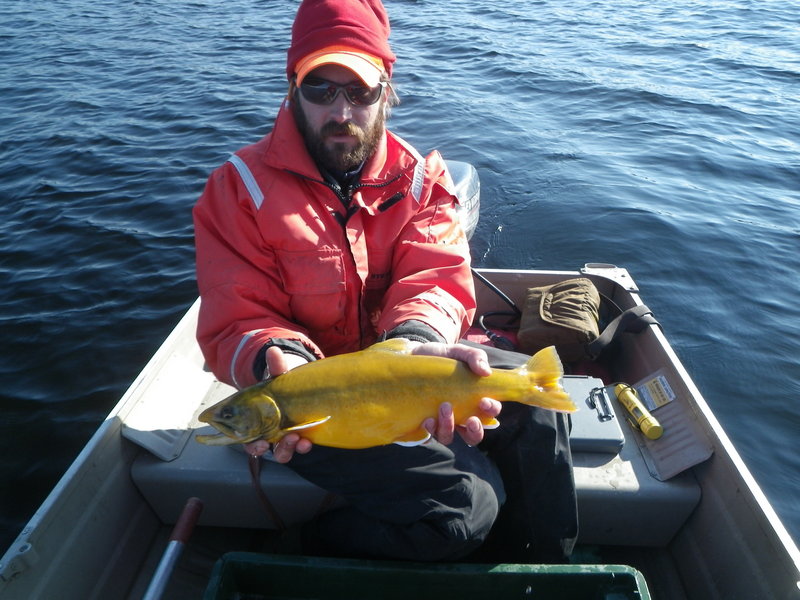Hurricane Sandy went easy on Maine compared to other states, but the effects of the super storm were felt even in small ways and as far north as Moosehead Lake.
For fisheries biologist Tim Obrey in Greenville, the rain that flooded Wadleigh Pond last week pushed back the conclusion of an historic project he has worked on for several years.
The population of Arctic char in the 157-acre pond is one of a few remaining in North America and one of just 12 populations in Maine, the only Arctic char populations in the lower 48 states.
But the pond has been threatened by the rainbow smelt that were illegally introduced several years ago.
Last fall, Obrey and his staff collected 50 wild char and 250 wild native brook trout from the pond and brought them to a hatchery in Frenchville, the same one used for the successful reclamation of Big Reed Pond, another Arctic char fishery.
Now Obrey is just days away from reclaiming the pond with the natural substance, rotenone, which will kill the invasive smelt.
But Sandy pushed the project back.
Obrey was supposed to apply the organic poison that would kill the smelt on Monday, before winter arrives in the Moosehead region.
Sandy confounded the wait for the rotenone, since the poison is being delivered from New Jersey, one of the states hit hardest by the storm. In addition, the rain that followed the storm washed over Wadleigh last week. And rotenone can’t be applied after a storm because it will wash away.
So Big Wadleigh right now is a big TBA.
“Welcome to my nightmare. We’re hoping the rotenone gets here,” said Obrey, a 26-year veteran who has needed to do only one reclamation before.
“But (even if it does), the forecast is for snow the middle to the end of (this) week. If the pumps freeze and we only disperse half the rotenone, the benefits are not worth it.”
Meanwhile, waiting in Mountain Spring Hatchery in Frenchville, the wild char have produced about 2,000 eggs, while the wild brook trout have produced about 3,500 eggs, Obrey said.
“We have all kinds of fish at the hatchery. And the plan is for us to go up and kill the pond next week. But everything is in turmoil. We’re trying to decide whether to do it this fall or push it to next fall. We’re cutting it close,” Obrey said.
Even if the project is pushed to the summer, it eventually will be good news for the lakes region.
Moosehead Lake Region has 144 native brook trout waters that have never been stocked. It also has three of the state’s native wild Arctic char waters — Big Wadleigh, Rainbow Lake and Penobscot Lake.
When completed, the project, which costs between $100,000 and $150,000, will return a unique fishery to Maine’s trout fishermen.
“It’s a very popular fishery for people who know about it,” Obrey said.
Staff Writer Deirdre Fleming can be contacted at 791-6452 or at:
dfleming@pressherald.com Twitter: Flemingpph
Send questions/comments to the editors.



Success. Please wait for the page to reload. If the page does not reload within 5 seconds, please refresh the page.
Enter your email and password to access comments.
Hi, to comment on stories you must . This profile is in addition to your subscription and website login.
Already have a commenting profile? .
Invalid username/password.
Please check your email to confirm and complete your registration.
Only subscribers are eligible to post comments. Please subscribe or login first for digital access. Here’s why.
Use the form below to reset your password. When you've submitted your account email, we will send an email with a reset code.